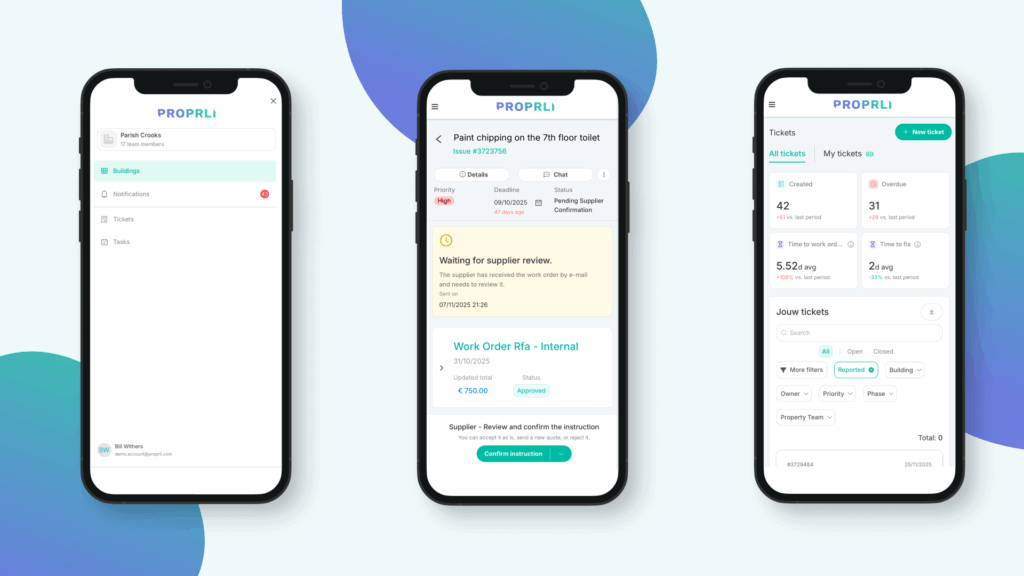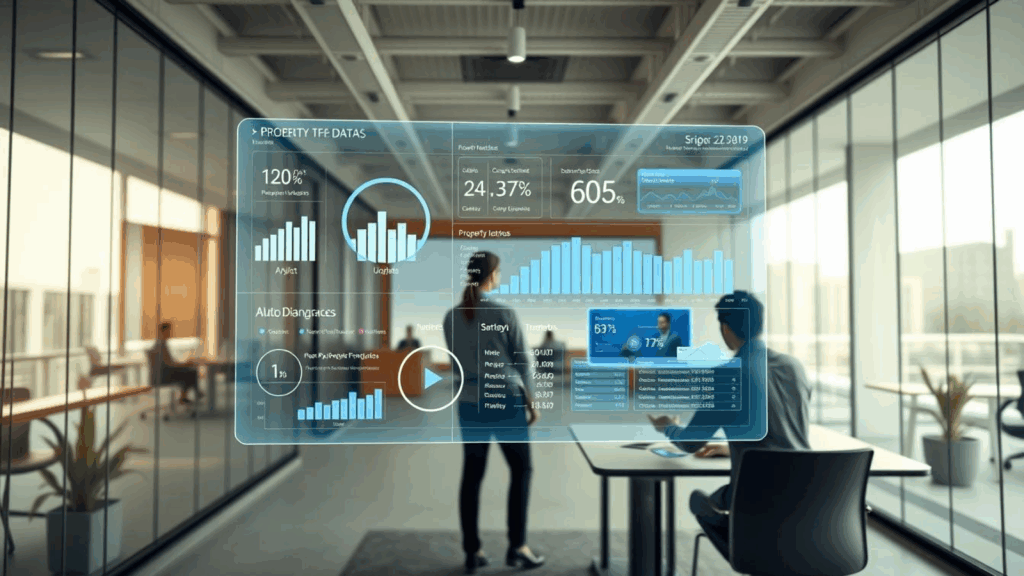Technological innovations have transformed the real estate sector significantly. They have reshaped how properties are listed, bought, sold, and managed. Thanks to these advancements, property management services have become more efficient. They’ve also enhanced the customer experience.
In this evolving landscape, technical property managers and technical asset managers are now more equipped to manage properties effectively, even without owning them. Their roles cover everything from technical management to achieving investment goals for their clients. Meanwhile, facility management maintains its unique position. The introduction of advanced technologies like online platforms, big data, smart devices, and virtual experiences is revolutionizing the way real estate transactions and management are handled.
Key Takeaways
- Technological advancements have revolutionized the real estate sector.
- Technical property managers focus on ongoing technical management.
- Technical asset managers aim to achieve clients’ financial goals.
- Advanced systems like big data and smart technologies play a critical role.
- Facility management remains distinct from property management.
Introduction to Technological Advancements in Real Estate
The real estate sector’s initial reluctance to adopt digital tools has dramatically shifted. Now, it fully embraces technological innovations. This shift mirrors the industry’s response to evolving consumer demands. It shows the significant impact of technology trends on real estate.
Historical Context
Real estate’s technological journey began with simple databases and later, sophisticated MLS systems in the late 20th century. The early use of websites and online listings paved the way for digital transformation. These initial steps were crucial for the technological revolution we see in real estate today.
Current State of Technology in Real Estate
Today, digital platforms, smart technologies, and diverse tools define real estate technology. These innovations enhance property management and client services. Mobile apps, cloud solutions, and AI analytics are at the forefront, shaping this industry. They cater to the tech-driven preferences of Millennials and Gen Z, who seek instant, savvy solutions for their real estate needs.
Enhanced Property Search and Listing
The real estate sector has transformed, altering the way properties are searched and listed. Innovations like online platforms and mobile apps have made it easier. Here, we explore how these advances are changing the industry.
Online Real Estate Platforms
Online platforms have become pivotal in property searches today. They provide extensive listings, market insights, and user feedback. This allows buyers and renters to access a vast amount of information, from visuals of the property to neighborhood data, streamlining the purchase process.
Mobile Applications for Property Search
Mobile apps are now crucial for those looking to buy. They let users explore listings, arrange viewings, and even apply for mortgages or leases on their phones. With features like alerts and updates, individuals are always in the loop about new listings that match their needs.
Virtual Tours and Interactive Maps
Virtual tours and maps have minimized the need for on-site visits, providing an engaging way to view properties. HD tours let buyers examine homes in detail remotely. Meanwhile, interactive maps show nearby facilities, schools, and transit, offering a comprehensive understanding of the property’s area.
| Feature | Benefit | User Preference |
|---|---|---|
| Online Real Estate Platforms | Comprehensive property data and reviews | High |
| Property Search Mobile Apps | Convenient, real-time updates | Very High |
| Virtual Tours | Immersive, detailed property exploration | Increasing |
Virtual Reality and Augmented Reality
The use of Virtual Reality (VR) and Augmented Reality (AR) is revolutionizing the real estate sector. These technologies offer life-like property tours, changing how we view and experience properties.
Virtual Reality Tours
Virtual reality in real estate lets buyers tour properties from anywhere. It’s an immersive experience that doesn’t require a physical visit. Potential buyers can walk through homes virtually. This provides a detailed sense of the layout and design. VR has expanded the market, allowing realtors to impress buyers with detailed and engaging tours.
Augmented Reality for Interior Visualization
Augmented reality is changing the game in real estate interior design. It helps buyers imagine furniture and decor in a property. This aids in making better purchasing decisions. AR allows the overlay of digital elements onto the real world. It offers a unique way to customize and envisage alterations instantly, improving the buying experience.
Real estate applications of VR and AR are gaining attention. With the demand for innovative and immersive experiences rising, VR and AR lead. They transform traditional property viewing, making it more accessible and efficient.
Streamlined Transactions Through Technology
In an era where efficiency and security are paramount, technological advancements have significantly streamlined real estate transactions. These innovations ensure a smoother and more reliable process for all parties involved.
Electronic Signatures
Gone are the days of cumbersome physical paperwork. With the advent of electronic signatures, documents can now be signed promptly and securely online. This advancement has not only expedited the process but also reduced error rates and the need for in-person meetings.
Online Payment Systems
The use of online real estate payments has revolutionized how financial transactions are conducted in the real estate sector. These systems facilitate secure and convenient transactions, thus enhancing the overall efficiency of property dealings. Buyers and sellers can now finalize payments quickly, reducing delays and promoting a swifter property transfer process.
Blockchain for Property Transactions
One of the most groundbreaking technologies impacting real estate is blockchain. Blockchain property transactions provide a transparent, secure, and immutable recording of ownership, which addresses many prevalent issues such as trust and fraud. By using blockchain, the entire transaction process becomes more reliable, assuring all parties of the legitimacy and accuracy of the recorded data.
To summarize, electronic signatures, online real estate payments, and blockchain property transactions are redefining the landscape of property management and real estate dealings. These technologies foster efficiency, trust, and a higher level of security in every transaction.
Big Data and Predictive Analytics in Property Management
Big data and predictive analytics have transformed property management entirely. These technologies enable managers to deeply understand market trends. They also support making decisions based on concrete data.
Market Trend Prediction
Real estate professionals utilize big data to predict market trends accurately. They analyze extensive datasets, gaining insight into future shifts. This predictive capability helps maintain property values and spot investment opportunities. Key decisions rely on solid, data-backed evidence.
Property Valuation
For real estate success, precise property valuations are essential. Predictive analytics offers exact property assessments by looking at past and current data, alongside future trends. This method reduces risks and enhances investment returns, providing a detailed view of a property’s worth.
Investment Opportunity Identification
Commercial property managers use analytics to find promising investments. By understanding the market changes, they identify potential opportunities to strategize investments. Insight from data aids in selecting lucrative real estate ventures.
The Role of IoT in Property Management
The Internet of Things (IoT) has become vital in property management, leading to significant progress. It streamlines remote operations, boosts real estate energy efficiency, and strengthens security. By integrating smart devices, IoT enhances operational efficiency and responsiveness.
Remote Monitoring and Control
IoT brings the power to monitor and control properties remotely for property managers. It allows the management of HVAC, lighting, and irrigation systems from afar. Thus, properties are maintained in top condition with minimal need for on-site visits. This boosts efficiency and immediately addresses tenant concerns, improving their satisfaction.
Energy Management
IoT upgrades real estate energy management significantly. Through smart meters and IoT devices, energy use is tracked in real-time. This gives property managers insights for informed decision-making, cutting down on energy use and costs. Automated adjustments based on occupancy and weather contribute to substantial energy savings and environmental care.
Security Systems
In property management, security is always crucial. IoT elevates security measures with smart locks, cameras, and motion detectors. These devices offer instant alerts and thorough monitoring, protecting tenants and property. Smart security systems allow for faster reaction to threats, improving the overall security approach.
The application of IoT in property management revolutionizes property care, security, and oversight. It empowers managers to reach new heights in efficiency, tenant contentment, and eco-friendliness through sophisticated technology.
| Feature | Benefits | Examples |
|---|---|---|
| Remote Monitoring and Control | Increased efficiency, quicker issue resolution | HVAC systems, lighting |
| Energy Management | Cost savings, sustainability | Smart meters, automated adjustments |
| Security Systems | Enhanced safety, real-time alerts | Smart locks, surveillance cameras |
Trend property management
Trend property management now leads the evolution in its industry, targeting efficiency and sustainability. The shift to digital platforms, new business models, and advanced technology has drastically changed how services are delivered and client interactions are handled.
The industry’s progression emphasizes the need to adapt to current trends. By focusing on digital tools for real estate transactions, operations have become smoother. This makes everything more accessible to those comfortable with technology. High-tech devices and platforms are key for property managers aiming to provide top-notch service. This reflects the dynamic nature of today’s rental property management.
Innovative business models are emerging to address the modern market’s complex requirements. These models are flexible and centered around the customer. They allow property managers to offer customized solutions. These meet the various needs of both property owners and tenants.
Here is a comparative look at the traditional and modern approaches to trend property management:
| Aspect | Traditional Approach | Modern Approach |
|---|---|---|
| Communication | In-person meetings | Digital platforms |
| Transaction Processing | Paper-based | Online systems |
| Property Viewing | Physical visits | Virtual tours |
| Maintenance Requests | Phone calls | Mobile apps |
| Market Analysis | Manual research | Big data analytics |
As the property management industry evolves, adopting new trends is crucial. Modern property management adopts smart, sustainable practices. These improve efficiency, enhance tenant satisfaction, and lead to better investment outcomes. Embracing a tech-inclusive, forward-looking approach is shaping the future of property management.
Property Management Solutions for Residential and Commercial Properties
In recent years, the field of property management has seen significant advancements due to cutting-edge solutions. These systems enhance operations such as tenant interaction and maintenance coordination. They mark a profound shift in how properties are managed, streamlining complex tasks into manageable ones.
A key advantage of these contemporary property management solutions is their adeptness in addressing the needs of various property types. This flexibility ensures operations run smoothly, whether it’s for residential or commercial estates. As a result, both landlords and tenants benefit from a more efficient, fulfilling experience.
When exploring the impact of these systems, consider the core areas of property management:
| Area | Residential Property Management | Commercial Property Management |
|---|---|---|
| Tenant Interaction | Enhanced communication channels for resolving issues quickly | Streamlined lease management and tenant relations |
| Maintenance Coordination | Automated scheduling and tracking of maintenance tasks | Proactive building maintenance and facility management schedules |
| Financial Management | Online rent collection and financial reporting | Comprehensive budgeting and expense tracking |
The shift towards integrating advanced property management solutions is emblematic of the industry’s evolution. By adopting these innovations, managers of both residential and commercial properties can heighten efficiency. More importantly, they can cultivate better relationships with tenants, which is crucial for long-term success.
Automation of Routine Tasks
The integration of automation in property management is revolutionizing operations. It makes routine tasks more efficient. By leveraging technology, manual labor decreases, and resource management improves significantly.
Automated Rent Collection
Through automated rent collection, timely payments from tenants are ensured. This approach streamlines exchanges between tenants and managers. It notably lowers delinquency rates while solidifying a steady flow of income, vital for managing properties effectively.
Inventory Management
Automation has streamlined real estate inventory management. It enables precise tracking of assets and supplies, making inventory maintenance straightforward. As a result, properties are consistently prepared for tenants, eliminating the need for manual inventory checks.
Vendor Contracting
Automating vendor contracting simplifies hiring and overseeing service providers. It makes renewing contracts and interacting with vendors effortless. This efficiency boost allows property managers to devote attention to strategic initiatives, enhancing overall management performance.
Smart Cities and Sustainable Development
In the modern urban landscape, smart cities are key to sustainable growth. They use top-notch technology to boost infrastructure and life quality. They also foster environmental conservation.
Data-Driven Urban Planning
Data-driven urban planning is pivotal for smart cities’ future. It involves analyzing data from urban activities to craft strategies. These strategies optimize resources and improve city operations. They boost traffic management and public services, cut pollution, and raise living standards.
Energy-Efficient Buildings
Energy-efficient buildings are essential for smart cities’ sustainable development. Such buildings employ advanced materials to cut energy use and carbon emissions. They also reduce costs. Adopting these technologies aids in ecological balance and offers economic advantages, making cities more resilient against environmental challenges.
IoT-Enabled Infrastructure
Smart cities’ commitment to sustainable growth includes IoT-enabled infrastructure. IoT devices enable the real-time monitoring of systems like lighting and waste management. This ensures efficient resource use, aiding environmental preservation and public safety.
| Feature | Description | Impact |
|---|---|---|
| Data-Driven Urban Planning | Utilization of data analytics to optimize city planning and operations. | Improves resource allocation, reduces pollution, enhances quality of life. |
| Energy-Efficient Buildings | Structures designed with technology to minimize energy consumption. | Lowers carbon footprints, reduces costs, supports ecological sustainability. |
| IoT-Enabled Infrastructure | Integration of IoT devices for real-time monitoring and management. | Enhances efficiency of urban systems, contributes to environmental preservation. |
Conclusion
Technology and property management merging has revolutionized the real estate industry. Enhanced customer experiences and smoother transactions stem from this integration. Predictive analytics and IoT technologies have been game changers. They have profoundly reshaped technical property and asset management operations.
The sector is poised for continued evolution, with property management services embracing advanced technologies. This evolution is not just about efficiency and precision. It also focuses on sustainable advancements. The future holds a focus on security and customer-orientated management, powered by innovation.
This integration marks a critical turning point in real estate. It reflects the sector’s ongoing transformation and commitment to betterment. Property management’s future will depend on leveraging tech innovations. These innovations aim to enhance value and fulfill the rising expectations of clients and stakeholders.
FAQ
What are trend property management and its significance in the real estate sector?
Trend property management highlights the latest industry shifts. These include digital tools, IoT, big data, predictive analytics, and VR/AR technologies. Their aim is to boost efficiency, enhance tenant satisfaction, and cater to modern tech-oriented clients.
How has technology transformed property management services?
Technology has drastically improved property management. It simplifies tasks such as locating properties, facilitating tenant-landlord communication, managing repairs, gathering rents, and offering market insights. Tools like VR tours, online platforms, mobile apps, and IoT have made property management more effective and user-friendly.
What is the impact of online real estate platforms and property search mobile apps?
Online platforms and mobile apps have revolutionized the property search. They offer up-to-date data, vivid photos, virtual tours, and interactive maps. This has made property exploration easier and reduced the need for in-person visits.
How do virtual reality (VR) and augmented reality (AR) enhance the property viewing experience?
VR and AR transform property viewing with immersive, interactive experiences. VR offers detailed virtual tours, letting buyers remotely explore properties. AR lets users envision decor and furnishings within a space, aiding in making well-informed decisions.
What role does blockchain play in property transactions?
Blockchain enhances property transactions by ensuring transparency, security, and permanence. It speeds up transactions with e-signatures and secure online payments. This makes the process quicker and more trustworthy.
How do big data and predictive analytics benefit property management?
Big data and predictive analytics provide insights on market trends, property values, and investment opportunities. This allows managers to make strategic, data-based decisions. It enhances investment results and operational efficiency in property management.
What is the significance of IoT in property management?
IoT technology enables remote oversight and management of elements like climate, lighting, and security. It boosts efficiency, saves energy, and enhances security. This contributes to more responsive, responsible property management practices.
What automation technologies are used in rental property management?
Automation in rental management utilizes technology for rent collection, inventory oversight, and contracting vendors. These improvements lessen manual work and streamline daily tasks. This frees managers to concentrate on strategic aspects.
How are smart cities influencing the future of property management?
Smart cities incorporate data-based urban design, energy-smart buildings, and IoT infrastructure. These developments play a key role in shaping property management’s future. They align real estate with wider ecological and technological objectives.
What are the benefits of using property management solutions for residential and commercial properties?
Property management solutions optimize operations for residential and commercial sites. They centralize tenant relations, maintenance, and financial tasks. This leads to smoother operations, better tenant relations, and overall enhanced property management.






